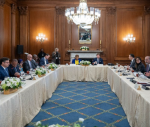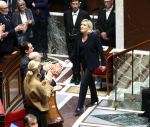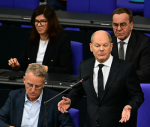You are here
A somber Christmas in Bethlehem
Dec 27,2017 - Last updated at Dec 27,2017
Christians in Jordan celebrated Christmas in peace and quiet while co-religionists in neighbouring Palestine faced the spiritual blow delivered by Donald Trump's recognition of Jerusalem as Israel's capital as well as restrictions imposed by the Israeli occupation. In Iraq and Syria Christians found churches burnt and gutted by years of warfare but Chaldeans in northern Iraq celebrated despite the destruction.
Christians in Bethlehem, the little town where Jesus was born 2017 years ago, marked the festival without joy. Services took place as always in the Greek Orthodox Church of the Nativity, built on the site of the stable where Jesus' family found shelter. The Catholic Church of St Catherine was packed for its traditional midnight mass. Coloured lights twinkled on the massive Christmas tree set up in Manger Square, marching bands featuring bagpipes performed traditional music,and choirs sang seasonal carols. Before Trump's announcement on December 6, all the inns in the city were fully booked, as they were at the time of the nativity. But Palestinian citizens of Israel hailing from Nazareth and Jaffa who often spend Christmas in Bethlehem stayed away and foreign tourists cancelled their visits to the city. The number of pilgrims dropped by 50 per cent as clashes between Palestinian protesters, some dressed as Santa Claus, and Israeli security agents erupted in the streets of Bethlehem near Israel's apartheid wall surrounding the city and on Salaheddin Street in East Jerusalem. Good cheer had dissolved.
Over the rank of shops under the colonnade in front of the Bethlehem Peace Centre hung a banner proclaiming in English, "Jerusalem will always be the eternal capital of Palestine", mocking Trump's challenge to the thousands of years-long Palestinian connection with Jerusalem.
When Jesus was born, Bethlehem was governed by King Herod, a client of regional hegemon Rome, and Jesus' parents Mary and Joseph, a carpenter, from their home in Nazareth to Bethlehem to be counted in a census. Today Bethlehem is occupied by Israel, which holds the US in thrall and claims the right to ownership due to the Jews ancient religious connection to the land of Palestine. While Palestinian citizens of Israel are permitted to visit Bethlehem, Palestinian Christians from Jerusalem and Gaza cannot freely travel to Bethlehem for Christmas celebrations. There are only about 50,000 Christians in the West Bank, 22,000 living in Bethlehem, thanks to a low birth rate and migration due to the lack of jobs and a political horizon. Palestinian Christians could, one day, disappear from their "little town" where Jesus was born if there is no "two state solution", involving the emergence of a Palestinian state in East Jerusalem, the West Bank and Gaza.
In northern Syria's Raqqa, once a city of 220,000 people, few Christians — once 1 per cent of the population — have returned to camp out in neighbourhoods, crumpled and levelled by US-led air strikes during the campaign to drive Daesh from its self-proclaimed capital. When Daesh took control in 2014, the cult gave Christians three choices: Convert to its puritan brand of Islam, pay a heavy tax, or get out. Christian churches and other non-Sunni religious premises were gutted and burned by Daesh which routed or killed Raqqawis of all faiths who did not subscribe to its radical ideology. After "liberating" the city in mid-October this year, the US-dominated Kurdish Syrian Democratic Forces began demining homes, businesses, streets, mosques and churches. But there are no services in Raqqa's ruined churches this Christmas. Only a few Christians have ventured back.
By contrast, in Mosul, Iraq's second city, Christians celebrated mass for the first time in four years. Chaldean Catholic Patriarch Luis Raphael Kako called on his congregation of hundreds to pray for "peace and stability in Mosul, Iraq and the world".
Muslim dignitaries and military officials stood side by side with Christians in St Paul's Church, its walls freshly whitewashed, sheets hanging over glassless window frames to keep out the cold.
When Daesh swept into Mosul in June 2014, all 45 Christian institutions — churches of various denominations, monasteries, community centres, and bishop's palaces were either destroyed or taken over by the cult and most of the city's Christians fled. Today, Omar Muhammad, known the world over as "Mosul Eye", has appealed to the city's Christians to return and recapture their lives. Muhammad, the secret blogger who risked his life to tell outsiders what was happening in his hometown after Daesh took control, proudly proclaimed Mosul has sprouted Christmas trees, churches have been repaired and renovated, and "hand-in-hand" Christians and Muslims were preparing to celebrate Christmas.
Having revealed his identity only recently, Muhammad wrote: "Mosul cannot be itself without all its components; Mosul without its Christians, Yazidis, Shabak, and the rest. It is not Mosul if the churches' bells do not ring along with the call for prayers from mosques, and trees are decorated at every home, regardless of religious preference."
Meanwhile, in Egypt, centuries-old discrimination and violence against Christians continues. Fifteen takfiri suspects have been arrested in connection with a pre-Christmas attack on a Coptic church in the village of Kafr Al Waslin south of Cairo. They erupted into the church after Friday prayers, smashed windows and furniture. The church has been a fixture in the village for 15 years, waiting to be licensed under legislation passed in August 2016 which was adapted from a law adopted from the Ottomans by the British overlords of Egypt in the 1930s. This required permission of the British governor for church construction. Once the British were turfed out by the revolutionary regime in 1952, the Coptic Church had to apply to the president for decrees licensing churches while Muslims needed only permission from the Ministry of Endowments. The latest law gives provincial governors power over church building with no right to appeal if refused.
During the 2011 Arab Spring uprising, Egypt's Copts, Catholics, and Protestants, who joined Muslims in mass protests, called for the abolition of such regulations. Like all those who joined the demonstrations in Egypt calling for "Bread, Freedom and Justice", the country's Christians, the largest of this region's Christian communities, have seen their hopes for justice dashed. The contrast between the situation in Egypt and Muslim-Christian solidarity in Bethlehem and Mosul could not be greater.













